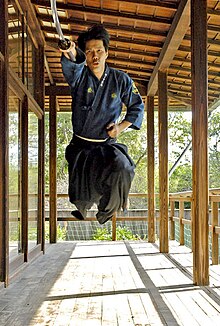Yagyū Munenori
Appearance

Yagyū Munenori (1571 – May 11, 1646) was a Japanese swordsman, the son of Yagyū Munetoshi, and founder of the Edo branch of Yagyū Shinkage-ryū school of swordsmanship. He is famous as the author of the Heihō kadensho (1632), an acclaimed treatise on practical swordsmanship and how it can be applied to life and politics. His sons, Yagyū Jūbei Mitsuyoshi and Yagyū Munefuyu, were also famous swordsmen.
Quotes

- It is bias to think that the art of war is just for killing people. It is not to kill people, it is to kill evil. It is a stratagem to give life to many people by killing the evil of one person.
- As quoted in The Japanese Art of War (1991) by Thomas Cleary
- See first with your mind, then with your eyes, and finally with your body.
- As quoted in Living the Martial Way : A Manual for the Way a Modern Warrior Should Think (1992) by Forrest E. Morgan, p. 88.
- Throwing down your own sword is also an art of war. If you have attained mastery of swordlessness, you will never lack for a sword. The opponent's sword is your sword. This is acting at the vanguard of the moment.
- As quoted in Soul of the Samurai (2005) by Thomas Cleary, p. 28
- Variant translation: If you have attained mastery of swordlessness, you will never be without a sword.
- Conquering evil, not the opponent, is the essence of swordsmanship.
- As quoted in Behold the Second Horseman (2005), by Joseph Lumpkin, p. 44.
- It is easy to kill someone with a slash of a sword. It is hard to be impossible for others to cut down.
- As quoted in Behold the Second Horseman (2005), by Joseph Lumpkin, p. 53.

- 兵法家伝書 Heihō kadensho, also translated as The Book of Family Traditions on the Art of War
- A stroke of the sword that does not hit its target is the sword stroke of death; you reach over it to strike the winning blow. Your adversary's initiative having missed its mark, you turn the tables around and get the jump on your adversary.
- Once a fight has started, if you get involved in thinking about what to do, you will be cut down by your opponent with the very next blow.
- When you strike a blow, do not let your mind dally on it, not concerning yourself with whether or not it is a telling blow; you should strike again and again, over and over, even four or five times. The thing is not to let your opponent even raise his head.
- There may be a hundred stances and sword positions, but you win with just one.
- If you gaze at a single leaf on a single tree, you do not see the other leaves. If you face the tree with no intention and do not fix your eyes on a single leaf, then you will see all the many leaves. If your mind is preoccupied with one leaf, you do not see the others, if you do not set your attention on one; you will see hundreds and thousands of leaves.

